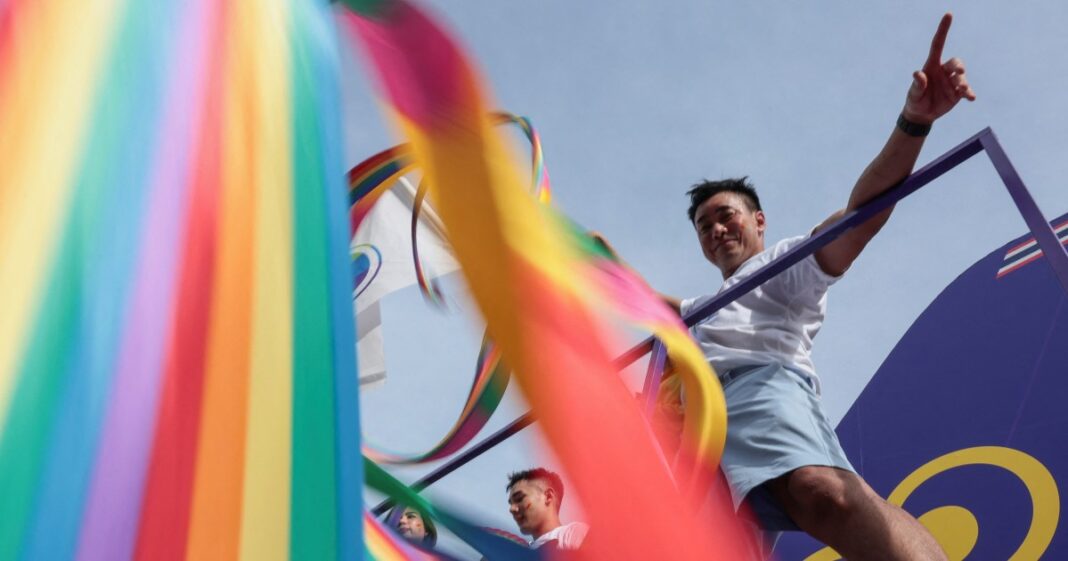Bangkok, Thailand – For three decades, Dujruedee Thaithumnus has presided over symbolic weddings between same-sex couples on the white sand beaches of Thailand’s Samui island.
As Thailand prepares to legalise LGBTQ marriages, Dujruedee is looking forward to officiating legally recognised ceremonies for the first time – and cashing in on the “pink baht”.
“Samui has all the ecosystem required to organise weddings, the island is a one-stop shop. I have no doubt after the bill passes, we’re going to be on the world map as an LGBTQ wedding destination,” Dujruedee, who charges anywhere between $1,000 and $50,000 for her beach packages, told Al Jazeera.
“There are no words to describe how thrilled I am,” Dujruedee said.
After years of failed attempts, Thailand’s marriage equality bill last month cleared its final parliamentary hurdle.
To become law, the bill must still receive royal assent – a step that is widely seen as a formality.
Once the law is on the books, Thailand will be one of only three places in Asia where same-sex couples can wed, along with Taiwan and Nepal.
Activists hope that the first same-sex weddings will take place as soon as October.
As the law finally catches up to Thai society’s broadly accepting attitudes towards sex and gender, countless businesses, from wedding planners to hotels, malls, medical institutions and mortgage brokers, are poised to benefit.
Apart from opening up new income streams for event planning businesses, the law will grant LGBTQ couples legal recognition of joint ownership of property, mortgages and insurance plans for the first time, bringing a new stream of consumers into the realm of financial services long denied to them.
Ploy Rahong, a real estate broker on Samui Island who plans to wed her girlfriend in October, said the legal change has her thinking about how to target sales of homes, island getaways, assisted living and retirement communities at the LGBTQ community.
“We want to create something special on the island, specifically for these couples,” she told Al Jazeera.
While government estimates vary, Thailand’s Pride month of celebrations, which have their most visible presence in Bangkok, Phuket, Pattaya and Chiang Mai, have been calculated to generate up to $120m in tourism and extra spending.
In a flurry of rainbow flags and floats, Bangkok on Sunday brought the curtain down on its Pride month festivities, billed by Thai authorities as the largest of their kind in Asia, featuring parades, drag catwalk competitions, art exhibitions, pop-up markets and concerts.
Thailand’s Prime Minister Srettha Thavisin strongly backed the law, seeking a rare political win and an economic boost for Southeast Asia’s second-biggest economy, which has struggled to match the post-pandemic recoveries of its regional peers.
Thailand’s central bank has forecast the economy to grow by a tepid 2.6 percent this year, up from 1.9 percent in 2023, but still behind neighbouring Malaysia and Indonesia.
“The government is ready to support Pride Festival … to boost the nation’s economy especially when it comes to spurring tourism,” Srettha said at the start of the closing “Love Pride Parade” on Sunday.
In late July, Thailand will formally put in its bid to host World Pride in 2030.
Thongnakarin Sukvatanachaiwongs, co-founder of Prism, an EDM festival that targets LGBTQ customers, said that he estimates Thai-run festivals aimed at the community are currently worth about $10m a year.
“It’s likely to be a lot more once we attract the global community, too,” he told Al Jazeera.
“If it’s done well, the pink economy has a lot to offer. Look at Taiwan Pride, it’s got bigger every year and it’s driving the economy … we‘re heading in that direction.”
Even so, the growing commercialisation of Thailand’s relatively liberal LGBTQ scene has not been without its sceptics.
“It’s natural that you see every mall in Thailand catch on to this Pride trend,” a branding officer at one of the kingdom’s biggest retail groups told Al Jazeera, requesting anonymity as they were not authorised to speak to the media.
“At the same time, in order for malls to survive, they can’t just do sales and promotions any more, they also have to be discerning with global issues, they have to be empathetic and loved by their customers.”

Still, many entrepreneurs are confident that the future is pink.
At the Pink Power Up Business Forum in Bangkok last month, speakers reeled off Thailand’s selling points as a global marketplace for everything from LGBTQ-focused film production to medical services and beauty.
“Thailand is already one of the top destinations for the LGBTQ community,” Manatase Annawat, president of Thailand Privilege, an enterprise under the Tourism Authority of Thailand that aims to lure expats to settle in the country, told Al Jazeera.
“Imagine after we pass the bill, Thailand could become the centre of the world for the community.”
Nikki Phinyapincha, a transwoman entrepreneur who founded Thailand’s first and only diversity equity and inclusion agency, said that there is growing appreciation that growing tolerance in society extends to consumers as well.
“I believe Thailand can become the first pink tiger nation … a global equality destination.”







